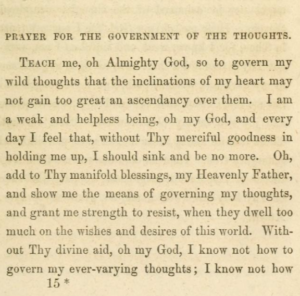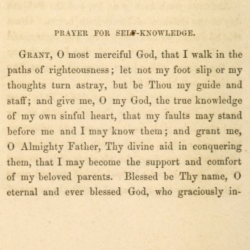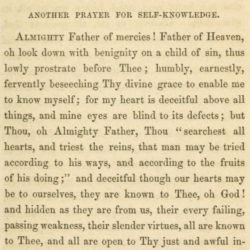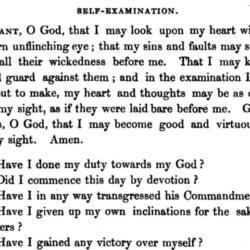Contributor(s): Shared on: 6 May 2023 under the Creative Commons Zero (CC 0) Universal license a Public Domain dedication Categories: Tags: | Contribute a translation | Source (English) |
|---|
|
Prayer for the government of the thoughts. | |
Teach me, O Almighty Father,
so to govern my wild thoughts,
that the inclinations of my heart
may not gain too great an ascendancy over them. | |
I am a weak and helpless being, O my God,
and every day I feel,
that without Thy merciful goodness upholding me,
I should sink and be no more. | |
O add to Thy manifold blessings, my Heavenly Father,
and show me the means of governing my thoughts,
and grant me strength to resist
when they dwell too much
on the wishes and desires of this world. | |
Without Thy divine aid, O my God,
I know not how to govern my ever-varying thoughts,
I know not how to lead them in the mght way,
nor can I turn them from their favourite objects. | |
O teach me how to govern them
so as to enable me to prevent them
from following too much the wishes and inclinations of my heart,
and then trifling sorrows and disappointments
will be less often mine,
for I am but a weak and sinful child of Earth,
and my wild thoughts will become wild desires,
if I know not how to govern them. | |
Grant me, O my God,
so to guide them in the right way,
that they may be free from guilt or even folly,
and that could my heart be open to the eye of man
as it is to Thee, O God,
I might not be ashamed of the thought contained therein. | |
Hear me, O my God,
for I put my trust in Thee,
for I know, weak, sinful as I am
without Thy divine assistance
I shall have no light to guide me
in my dark and difficult path,
and my strength will fail me
ere I reach that destined spot
where peace and joy will be my blest reward. | |
Then through Thine infinite mercy hear me,
O most merciful and Almighty God.
Hear me, and answer me
from Thy throne of resplendent brightness,
and for the sake of Thy Holy and Awful Name
O grant my prayer!
Amen. |
“Prayer for the Government of the Thoughts” by Grace Aguilar was published posthumously by her mother Sarah Aguilar in Sabbath Thoughts and Sacred Communings (1853), pp. 74-75. In Essays and Miscellanies (1853) the prayer appears on pages 177-178. Source(s)
 Grace Aguilar (2 June 1816 – 16 September 1847) was an English novelist, poet and writer on Jewish history and religion. Although she had been writing since childhood, much of her work was published posthumously. Among those are her best known works, the novels Home Influence and A Mother's Recompense. Aguilar was the eldest child of Sephardic Jewish refugees from Portugal who settled in the London Borough of Hackney. An early illness resulted in her being educated by her parents, especially her mother, who taught her the tenets of Judaism. Later, her father taught the history of Spanish and Portuguese Jews during his own bout with tuberculosis which had led the family to move to the English coast. After surviving the measles at the age of 19, she began to embark on a serious writing career, even though her physical health never completely recovered. Aguilar's debut was an anonymous collection of poems, The Magic Wreath of Hidden Flowers. Three years later she translated Isaac Orobio de Castro's Israel Defended into English at her father's behest. Later her The Spirit of Judaism drew interest and sales in both Britain and the United States after being published in Philadelphia by Isaac Leeser. He added a preface to the work elucidating his differences with her, the first of many clashes her work would have with mainstream Jewish thought. In the 1840s her novels began to attract regular readers, and Aguilar moved back to London with her parents. Despite her success, she and her mother still had to operate a boys' Hebrew school to stay solvent, which she resented for the time and energy it took from her writing. In 1847, she became ill again with a spinal paralysis which she did not let prevent her from visiting her brother in Frankfurt. Her health worsened and she died there that September. Aharon Varady (M.A.J.Ed./JTSA Davidson) is a volunteer transcriber for the Open Siddur Project. If you find any mistakes in his transcriptions, please let him know. Shgiyot mi yavin; Ministarot naqeni שְׁגִיאוֹת מִי־יָבִין; מִנִּסְתָּרוֹת נַקֵּנִי "Who can know all one's flaws? From hidden errors, correct me" (Psalms 19:13). If you'd like to directly support his work, please consider donating via his Patreon account. (Varady also translates prayers and contributes his own original work besides serving as the primary shammes of the Open Siddur Project and its website, opensiddur.org.) Read a comment / Leave a comment (moderated) Works of related interest: |













Leave a Reply